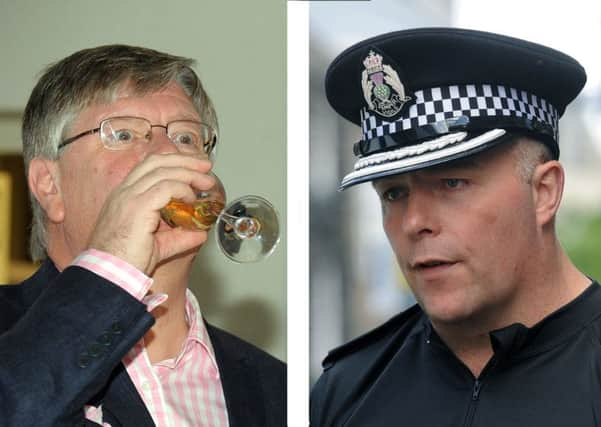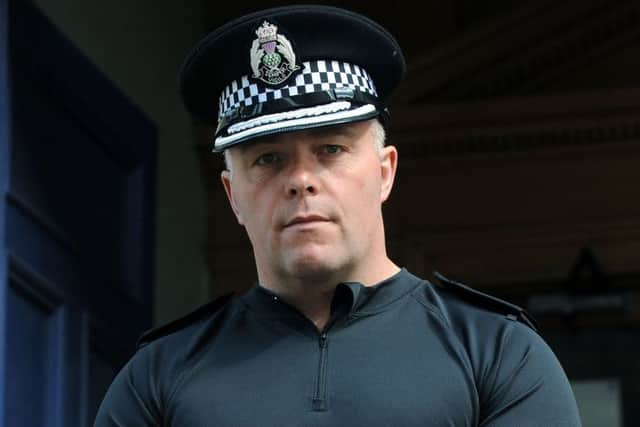Senior cop slams licensing chief Eric Milligan


Councillor Eric Milligan, who has led the licensing board since 2012, was said to have “antiquated” views on alcohol consumption that were putting public health and safety at risk.
The former Lord Provost has repeatedly denied there is a direct link between the number of licensed premises concentrated in an area and levels of alcohol-related health and crime issues, waving through a number of controversial pub plans despite objections from police and health officials.
Advertisement
Hide AdAdvertisement
Hide AdAnd today a police superintendent rounded on the Labour councillor for Sighthill/Gorgie, saying that the failure to impose a tougher licensing regime in parts of the city centre swamped with bars, pubs and off-licences was affecting their ability to investigate domestic abuse and housebreaking.


Superintendent Matt Richards said officers were being “dragged into the city centre” every weekend to protect revellers and keep streets safe, taking already stretched resources away from dealing with problems in outlying residential areas. And he warned the Capital’s drink problem was also creating a rising tide of racially-aggravated abuse of door staff, many of whom come from Eastern European countries.
Asked for his response to the licensing board convener’s views on overprovision, Supt Richards said: “Anyone in a position of responsibility in regards to licensing that doesn’t take on board the wealth of domestic and international evidence is failing in their responsibilities.
“Some of the attitudes that are pervasive need to be up to date, as they are maybe a little bit antiquated.”
The comments come after health, fire and police chiefs warned a gathering of senior council officials that alcohol licensing overprovision was directly responsible for chronic health problems, fire deaths and public disorder in the city.


Addressing a meeting on Tuesday attended by chief executive Sue Bruce and council leader Andrew Burns, fire service group manager Steve Gourlay said 60 per cent of fire deaths in Scotland were linked to alcohol consumption, contributing to a fire death rate twice that in England. And statistics for 2013 indicated more than 80 fires in the Capital were linked to the use of drugs or alcohol.
NHS Lothian chief executive Tim Davison said that the solution to the £220m drain on health resources across Scotland caused by alcohol was “fewer outlets, less availability, higher prices”.
Supt Richards was also present at the Edinburgh Partnership meeting, and warned that “overprovision of alcohol is a major issue for us.”
Advertisement
Hide AdAdvertisement
Hide AdSpeaking to the Evening News, he confirmed that policing resources were “over-stretched” because of the failure to tackle the spread of licensed premises.
Supt Richards said: “A lot of the security industry in Edinburgh is made up of foreign visitors and foreign students, with a lot of Eastern European individuals that do door work.
“They really draw attention from drunk people. We do get a lot of racial abuse of door staff. These are all things that cause officers to be called out.”
And he added: “My feelings are that all those areas should be dealt with as overprovision.”
“Where we know there to be problems, it seems to me a little unsettling that that isn’t reflected in licensing board policy.”
Supt Richards said Police Scotland had a “finite number of resources” to tackle drink-fuelled disorder at weekends, making policing of violent crime and burglary more difficult. He said: “Domestic abuse is a major issue for us. We can’t concentrate on residential areas, we can’t concentrate on domestic abuse in residential areas, we can’t concentrate on youth crime in residential areas, car thefts, housebreakings, in the way that we would like to if we had all of our resources available, because a huge number of resources are being dragged into the city centre on a Friday and Saturday night to keep people safe.
“That wouldn’t be quite as pervasive if we had a more robust over-provision policy. Absolutely without a doubt, if over-provision is allowed to continue, finite police resources will continue to be overstretched.”
Contacted by the Evening News, Cllr Milligan reiterated his view that there was no direct link between licensing overprovision and alcohol-related problems, and said police, fire and health officials had the opportunity to comment on all licensing applications in problem areas. He said that the licensing board accepted that some areas had too many bars and restaurants, but added that people had tried to “extrapolate” figures for alcohol-related health problems and public disorder from the number of licensed premises.
Advertisement
Hide AdAdvertisement
Hide AdMr Milligan said: “There has been quite a lot of research that comes to the view that there is a connection between how many bars there are in an area and alcohol problems, but there’s quite a lot of research that questions entirely that connection.
There are ten members of the licensing board. We do look at these matters very seriously, and we are very mindful of the strains it places on police resources. We take a very responsible attitude towards alcohol consumption.”
But he added: “What is encouraging, and it goes some way to countering the view that is being put by those people, is that alcohol consumption is dropping. The message is getting through to the public that if you’re going to consume alcohol, be very careful how much you put down your throat.
“This is an issue that has existed for 200 years. There is no silver bullet. There are no easy answers.”
The licensing board has come under fire since November last year, when it passed a new licensing policy that fell far short of expectations from NHS Lothian and Police Scotland, who called for tough powers to reject new licensing applications in specific areas.
Instead, the seven problem-drinking hot spots – Tollcross, Dalry and Fountainbridge, Southside and Canongate, Old Town and Leith Street, Leith South, Leith Docks, and Portobello – were labelled areas of “serious or special concern”. Critics at the time branded the move a “farce” and “not worth the paper it’s printed on.
Figures for 2012-13 show that the licensing board rejected just one application, compared with 67 that were passed. Despite NHS Lothian lodging formal objections to 19 licensing applications on health grounds in 2013, every single one was waved through by councillors.
Chas Booth, Green councillor for Leith who sits on the licensing board, said: “I agree with Supt Richards that those who have responsibilities for making licensing decisions need to listen to the substantial evidence that increased supply of alcohol is linked to a host of social problems.
Advertisement
Hide AdAdvertisement
Hide Ad“That doesn’t mean the licensing board should turn down every license application the police or NHS object to, but it does mean we should examine the evidence they put forward very carefully.”
Consistently controversial
COUNCILLOR Milligan has consistently attracted controversy and criticism since being installed as licensing board convener in 2012.
In November, plans for a giant “superpub” on Rose Street were waved through by the licensing board despite opposition from police, health authorities, local residents and heritage campaigners. The Waxy O’Connor’s pub would have held 900 drinkers, and was approved when councillors failed to come up with a new licensing policy despite pleas from NHS Lothian and Police Scotland.
At the time, Cllr Milligan said: “We shouldn’t send out the message that the city is shutting up.” The proposals were later blocked by campaigners at the planning stage.
In May this year, police and health officials blasted the licensing board for approving two licensed supermarkets in Tollcross, despite fears of over-provision in the area. Chief Superintendent Mark Williams said he was “disappointed” at the decision.
Later that month, in an interview with the News, Cllr Milligan claimed there was “no direct link” between overprovision and alcohol-fuelled health issues or disorder.
In July, the convener was reported to the standards watchdog over claims he adopted a “bullying” stance towards anti-booze campaigners. That same month, the city’s licensing forum, the advisory body on licensing policy, said it would challenge Cllr Milligan’s stance on overprovision.